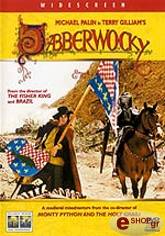Και αφού απολαύσαμε την τρισδιάστατη κινηματογραφική Αλίκη, έχω μερικές απορίες, μια και δεν έχω πρόσβαση σε μετάφραση τού Through the Looking-Glass, and What Alice Found There (Από την άλλη μεριά του καθρέφτη). Κυκλοφορούν μεταφράσεις των εκδοτικών οίκων: Ερατώ (1999), Πατάκης (1998), Λιβάνης (1995), Νεφέλη (1991), Ύψιλον (1979), ίσως και παλιότερες.
Με ενδιαφέρουν περισσότερο τα παρακάτω:
1. Έχει μεταφραστεί το όνομα του Τζαμπεργουόκι;
2. Πώς έχουν μεταφραστεί οι Tweedledum και Tweedledee;
3. Έχετε το κουράγιο να αντιγράψετε εδώ τη μετάφραση του ποιήματος του Τζαμπεργουόκι;

Με ενδιαφέρουν περισσότερο τα παρακάτω:
1. Έχει μεταφραστεί το όνομα του Τζαμπεργουόκι;
2. Πώς έχουν μεταφραστεί οι Tweedledum και Tweedledee;
3. Έχετε το κουράγιο να αντιγράψετε εδώ τη μετάφραση του ποιήματος του Τζαμπεργουόκι;
'Twas brillig, and the slithy toves
Did gyre and gimble in the wabe;
All mimsy were the borogoves,
And the mome raths outgrabe.
"Beware the Jabberwock, my son!
The jaws that bite, the claws that catch!
Beware the Jubjub bird, and shun
The frumious Bandersnatch!"
He took his vorpal sword in hand:
Long time the manxome foe he sought—
So rested he by the Tumtum tree,
And stood awhile in thought.
And as in uffish thought he stood,
The Jabberwock, with eyes of flame,
Came whiffling through the tulgey wood,
And burbled as it came!
One, two! One, two! and through and through
The vorpal blade went snicker-snack!
He left it dead, and with its head
He went galumphing back.
"And hast thou slain the Jabberwock?
Come to my arms, my beamish boy!
O frabjous day! Callooh! Callay!"
He chortled in his joy.
'Twas brillig, and the slithy toves
Did gyre and gimble in the wabe;
All mimsy were the borogoves,
And the mome raths outgrabe.
Did gyre and gimble in the wabe;
All mimsy were the borogoves,
And the mome raths outgrabe.
"Beware the Jabberwock, my son!
The jaws that bite, the claws that catch!
Beware the Jubjub bird, and shun
The frumious Bandersnatch!"
He took his vorpal sword in hand:
Long time the manxome foe he sought—
So rested he by the Tumtum tree,
And stood awhile in thought.
And as in uffish thought he stood,
The Jabberwock, with eyes of flame,
Came whiffling through the tulgey wood,
And burbled as it came!
One, two! One, two! and through and through
The vorpal blade went snicker-snack!
He left it dead, and with its head
He went galumphing back.
"And hast thou slain the Jabberwock?
Come to my arms, my beamish boy!
O frabjous day! Callooh! Callay!"
He chortled in his joy.
'Twas brillig, and the slithy toves
Did gyre and gimble in the wabe;
All mimsy were the borogoves,
And the mome raths outgrabe.



